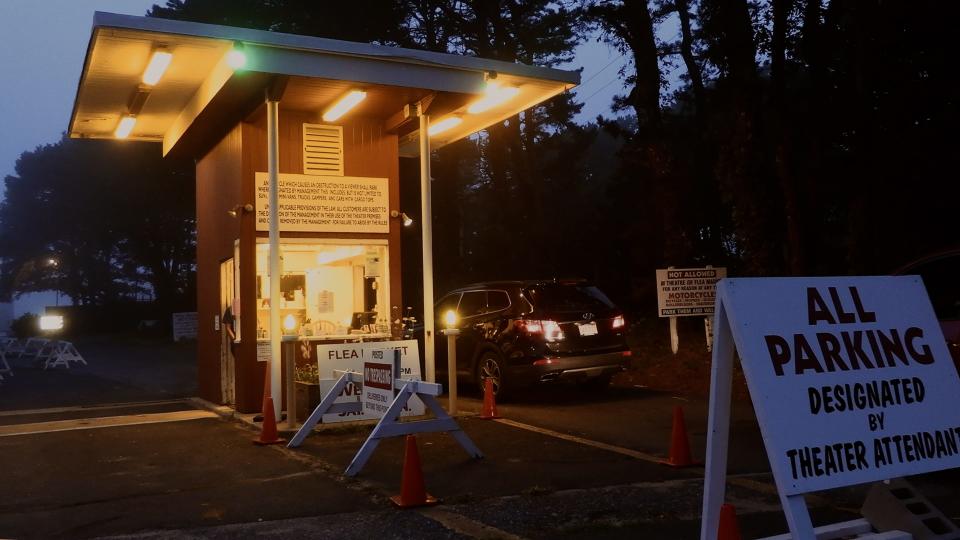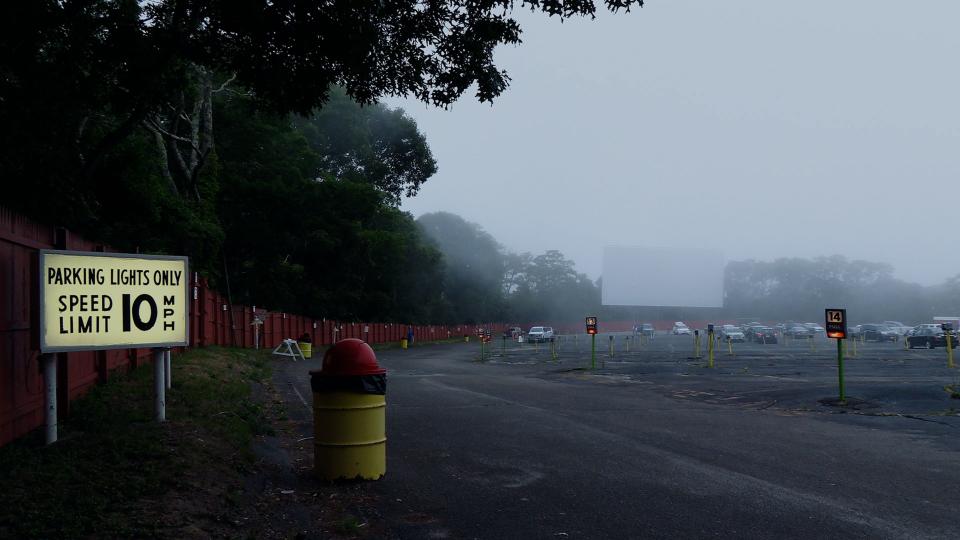Have you been to the Wellfleet Drive-In? It's now featured in a new movie.
Each season in New England holds its own magic, and all-too-brief summer is when memories like no other are made: a few trips to the beach, devouring succulent seafood platters, and too much ice cream (Can you have too much ice cream?).
One exclusive summer enjoyment is the drive-in movie theater, which award-winning director and filmmaker April Wright celebrates in her “Going Attractions'' series. “Back to the Drive-in” is Wright's second documentary about the sentimental subject, and it will premiere with a Monday, June 6 screening at Wellfleet Drive-In Theatre — one of 11 drive-ins featured in the film.

"Back to the Drive-in," Wright’s follow-up to 2013’s “Going Attractions: The Definitive Story of the American Drive-in Movie,” shows an updated snapshot of drive-in owners, and their labor-of-love experience, during a return to some normalcy after a business boom during the height of the pandemic.
An experience that has remained relatively consistent from its inception in 1933 to the present day, the drive-in holds the same coalescing magic it always did, allowing us to pack all our troubles in our old kitbag, even if it is only for a few hours. Although drive-in theaters seem to have experienced their resurgence in waves, and over the years their numbers have diminished, don't count them out: In 2023, the drive-in will celebrate 90 years of summertime entertainment.
“I wanted to profile how hard it is to keep a drive-in going and how much these families care about their drive-ins, care about having entertainment experiences where families and friends can come and gather together and have an experience that creates those memories that happen when you go to a drive-in,” explains Wright. “It’s really not even about the movies. It's just to implant those good family memories, especially for children, is what people want to do. They're doing it for families, they're doing it for kids, they're doing it for their communities, and it's not easy. I wanted to show that.”
Coming up: Director Luca Guadagnino, Jenny Slate, Bowen Yang to be honored at Provincetown film fest
John Vincent, co-owner of Wellfleet Drive-In who is president of The United Drive-in Theater Owners Association and is involved with the National Association of Theater Owners, calls this type of outdoor movie-going “a great business to be in. … You're making people happy and that's what makes a lot of people love the business, including myself.”
Lingering pandemic issues made the early 2021 summer season challenging for all theaters, including drive-ins, because of what movie content was available, and “Back to the Drive-in” was filmed in that timeframe. “Since then, we have seen a return to normal and drive-in theaters will continue to be viable for years to come,” Vincent says.
Wellfleet Drive-In Theatre, which reopened for the season just before Memorial Day, has screened films since 1957 and still uses operational speakers you can attach to your car (FM car-stereo optional). Wright says she chose the Wellfleet theater off Route 6 for its time-capsule charm. “I just felt like it is one of the almost stuck-in-time drive-ins that is very authentic. And part of why it is authentic is the ownership,” Wright says.

According to Vincent, that authenticity isn't going anywhere anytime soon. Considered a relic by today's standards, the speakers served a purpose well past the switch over to the radio.
“The speakers were saved because in the ‘80s and ‘90s, we needed a public address system for the giant flea market we have here. That had a hand in why we maintain them,” explains Vincent. “We used to have a lot of lost parents, as they say. We used to have to announce when bad weather was coming to the vendors. That's all gone away because people can do that on their cell (phone).”
If you would like to see the nostalgic tradition continue, Vincent says, “The best way to help a local drive-in to survive the long term is to become a regular customer, and you won't be disappointed.”
'About more than the movie'
Wright had more to say about her new "Back to the Drive-in" documentary in a recent interview:
Q: Why did you choose Wellfleet Drive-in as part of your documentary?
A: I went to the Wellfleet for the first time, and it was just beautiful. It's so authentic. (Vincent) gave me a tour and explained how (on) Cape Cod, the laws are set up so that all the land would be kept mostly as is. It is a place that has so much green and trees and undeveloped areas. I think that's what makes it so beautiful, and why so many people love spending time there because it is somewhat untouched. … At the Wellfleet, even if they wanted to add a second screen and make changes, they really couldn't, without going through many challenges and hoops because of the environmental protections, and how things can be built and developed on Cape Cod. That helps that drive-in to stay as it was originally built and there are many others in the country (like that). I tried to show a few in the film where you still have the original screen and you have the authentic experience but, I just really thought Wellfleet was a unique drive-in. A very authentic drive-in. The fact that John is so involved with all the industry things that are going on, I thought he was a good person to include in the film.
Coming up: Nantucket Film Festival to honor Oscar winner Barry Jenkins, John Turturro, Ramin Bahrani
Q: I noticed while I was watching people interviewing you, that they get a little giddy when they start speaking to you about the drive-in. You can literally watch their eyes start to gleam.
A: It's true. I know exactly what you're saying. It ties into when you are a kid or young adult, and it is about more than the movie, it's about the memories that are created. Every time I talked to people, when I started making the first documentary, anybody who had that experience could remember it. They could tell me where they were, what it smelled like, what it felt like, what movies they saw, what drive-in. These were really specific ingrained memories that people had.
It's a very different thing than streaming a movie at home where you can't remember, where it all blends together. When you go see a movie at a movie palace or at a drive-in, it really does create a memory and a lot of the people who we consider to be some of the great filmmakers like Martin Scorsese, James Cameron, Spike Lee, they all talk about going to see movies in movie palaces or at drive-ins, and that was how they fell in love with cinema.
Outer Cape history: 'Stunned at the sheer brutality': Author Casey Sherman's 'Helltown' explores Costa serial murders on Cape Cod
It is an interesting juncture we're at right now. It's this question about what the theatrical experience is worth, because future filmmakers may not feel the same in their love of cinema if they don't have those experiences. It's definitely going to be a generational shift if we don't keep the theatrical experience as magical as it has been in the past.
Q: You've made more than one film that touches on nostalgia and you are getting ready to make another film about roller-skating rinks, bowling alleys and family-owned amusement parks. Can you tell me more about that?
A: I don't call myself a nostalgia person. When I started this “Going Attractions” idea, there were all the things that there used to be so much of, and they are more like the family-based attractions, that there's less and less, and all these factors that are making them harder to survive. So for me, drive-ins, movie palaces, roller-skating rinks, bowling alleys and family-owned amusement parks were sort of my top five. I've made (movies about) two of those. I'm working on the other three. So is there a nostalgic piece of that? Absolutely. Because everybody that grew up going to those places knows there's less of them.
Local setting: Nantucket is being used to tell a Revolutionary War tale with Vermont roots. Here's how
But for me, I think I try to get to the subtext of the message of the documentaries. It's not just nostalgia, because with nostalgia you're sort of yearning for something that used to be and I like to think, “Wow, there's also a message here a little bit about the cultural changes and the choices that we make and where we spend our time,” like I say, in purely financial-driven decisions versus family or community-based decisions. All of these communal areas that we used to have so many of, that are now falling to the wayside because people are either spending more time alone on their computers at home, playing video games, or streaming independently, without that communal engagement and discussion of what you saw in the film and all of that.
I think it is making us a little more isolated. From an economic perspective, decisions have been made. But, from a cultural community perspective, those have not been the best long-term decisions and I think we are seeing some of the effects of that right now.
I'm not a professor of psychology or sociology or any of those topics, but that's what I've come to the conclusion, just based on my travels, and seeing what towns look like when they have places like this, and what towns look like when they don't. I want people to think about that when the next place comes up for demolition. It's not so much a “remember when” for me, but when we had more of these things, maybe it was a little better. I think that might be my going-in theory. Is that nostalgia? I don't know.
This article originally appeared on Cape Cod Times: Wellfleet Drive-In featured in "Back to the Drive-in" documentary

